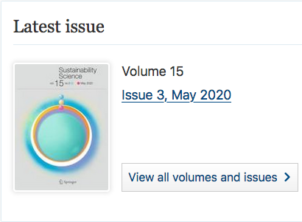
By Mary Menton, Carlos Larrea, Sara Latorre, Joan Martinez-Alier, Mika Peck, Leah Temper & Mariana Walter.
Abstract
Through their synergies, trade-offs, and contradictions, the sustainable development goals (SDGs) have the potential to lead to environmental justices and injustices. Yet, environmental justice (EJ), and social justice more broadly, are not currently embedded within the language and spirit of the SDGs. We part from the premise that “many ‘environmental’ problems are, by their very nature, problems of justice” (Lele, Wiley Interdiscip Rev Water 4:e1224, 2017). We review progress in EJ frameworks in recent years, arguing for the need to move beyond a focus on the four principles of mainstream EJ (distribution, procedure, recognition, and capabilities) towards a more intersectional decolonial approach to environmental justice that recognises the indispensability of both humans and non-humans. EJ frameworks, and the SDGs should recognise power dynamics, complex interactions among injustices, and listens to the different ‘senses of justice’ and desires of theorists, activists, and other stakeholder from the Global South. We analyze how EJ frameworks are, or fail to be, incorporated in the SDGs with a focus on the food–water–health nexus (SDG2, 3, 6); climate-energy (SDG7, 13), conservation (SDG14, 15); and poverty and inequality (SDG1, 10). We call attention to the ‘elephant in the room’—the failure to go beyond GDP but instead include economic growth as a goal (SDG8). We argue that sustainable degrowth and intersectional decolonial environmental justices would create better conditions for the transformative changes needed to reach the broader aim of the SDGs: to leave no one behind.
Keywords
Injustice, Just sustainability, Environmental justice, Social justice, Intersectionality, Decoloniality
Link
https://link.springer.com/article/10.1007/s11625-020-00789-8
How to cite
Menton, M., Larrea, C., Latorre, S. et al. Environmental justice and the SDGs: from synergies to gaps and contradictions. Sustain Sci (2020). https://doi.org/10.1007/s11625-020-00789-8

The project ENVJUSTICE has received funding from the European Research Council (ERC) under the European Union’s Horizon 2020 research and innovation programme (grant agreement No. 695446)